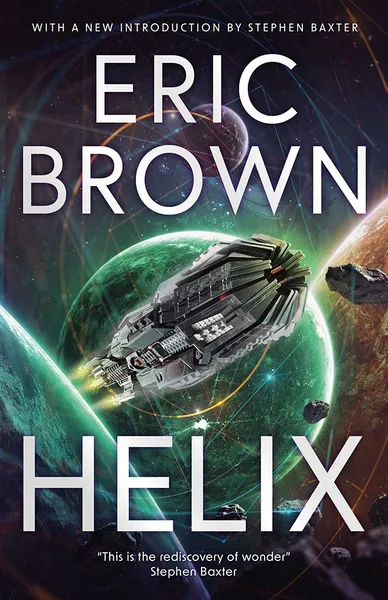SciFiNow speaks to Eric Brown, the author of Bengal Station, about his new novel, Helix.
Your latest novel, Helix, features thousands of worlds in a spiral construct, arranged around a sun. What would you say was the main inspiration behind this idea?
The idea came to me when I was dining with a friend years ago. In the middle of a table was an old oil lamp with an oblate glass cowl, and on the cowl was a coloured thread. I remember thinking that the flame at the centre resembled a sun, and the piping a space station. After that, the possibilities for adventure stories seemed endless. I decided to use one of my favourite sci-fi scenarios – the crash-landed starship – and it took off from there.
Do you ever base any of your characters on people you know, or even yourself?
Most of my central characters are based on myself, or aspects of myself. After all, I know myself better than I know anyone else. In any given situation within a novel I’m writing I always ask myself how I’d react, and often the emotional situations experienced by my characters are situations I’ve found myself in.
What would you say is the most exciting book you’ve read in modern science fiction?
That’s a tough question. For sheer, seat of the pants thrills, I’d say Black Man by Richard Morgan – it also works on many other levels. Earlier, I found Alfred Bester’s novels thrilling: they’re proto-cyberpunk. I find the novels of Robert Charles Wilson thrilling for the combination of characterisation and the ideas he writes about.
With television as the preferred medium of entertainment for many people these days, do you think that interest in books is declining?
I don’t think so. Aren’t more books being published nowadays than ever before? There’s certainly more choice than ever before. The thing that books have over television is their range; it seems that the entire gamut of what it is to be human can be found between the covers of books.
You’re a regular columnist in The Guardian, and you have quite a few titles to your name already. Did you always want to be a writer?
I never read a book until I was 15. Then I read a novel by Agatha Christie, and I was hooked. Not long after that I discovered Wells and Silverberg, who after Christie were mind-blowing. All I wanted to do after that was to write sci-fi.
What would your advice be to anyone who might be thinking of writing a science-fiction novel?
Read a lot in the genre to get a feel for what’s gone before, and then write, and stick at it. If you want it badly enough, you’ll succeed. The only people who fail are those who stop.
Creating within the genre obviously requires a great passion for it, but what is it about science fiction that appeals to you most?
The freedom. The idea that the entire span of space and time can be used to tell whatever tale I want to tell – the only limiting factor is the breadth of my imagination. One thing is certain about human life: it will change, and it’s exciting to write how those changes might come about.


